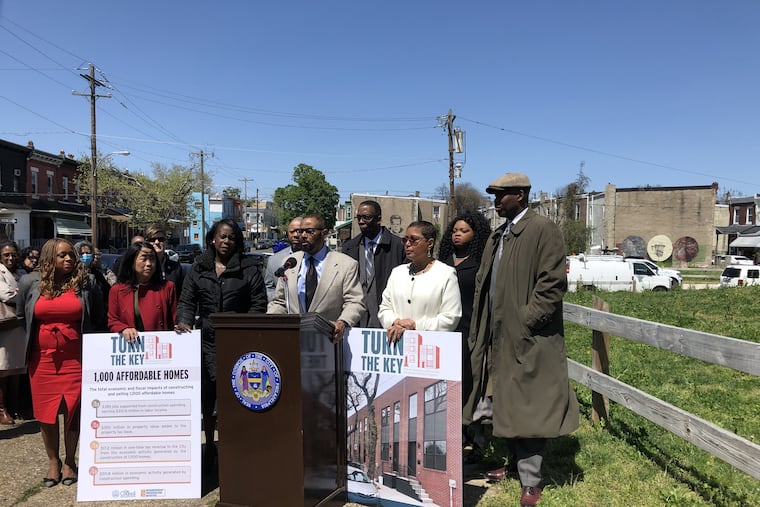Philadelphia is giving away land and subsidizing mortgages in a plan to build 1,000 affordable homes
It's the latest step in City Council’s Neighborhood Preservation Initiative, a $400 million plan to build and preserve affordable housing and revive commercial corridors.

Philadelphia is essentially giving away city-owned land as part of a plan to build 1,000 homes for first-time buyers with limited incomes and to chip away at the city’s deficit of affordable housing, officials announced Thursday.
The Turn the Key program is the latest and largest step so far in City Council’s Neighborhood Preservation Initiative, a $400 million plan to build and preserve affordable housing, help first-time home buyers, and revive commercial corridors at a time when housing is becoming increasingly unaffordable for Philadelphians.
» READ MORE: Philly’s first-time home buyers will get more help from the city when its grant program return
The program will start with $7 million or $8 million in funds in what amounts to Philadelphia’s largest investment in affordable housing in decades.
“It’s so important that we are stepping up as a local government,” Anne Fadullon, the city’s director of planning and development, said at a news conference Thursday in front of two vacant city-owned lots in West Philadelphia that will eventually hold about 40 homes.
The 1,000 homes will be spread across the city. Philadelphia is soliciting proposals from developers to build energy-efficient homes with three bedrooms and 1½ bathrooms to be sold at a maximum price of $250,000. Homes in Philadelphia sold for a median price of $272,750 in March, according to Berkshire Hathaway HomeServices Fox & Roach Realtors. Homeowners will pay about $1,200 per month for their mortgage.
Building on publicly owned land reduces development costs, which lowers home prices. The city plans to sell the lots for a nominal fee.
Construction of the first 100 homes likely will start over the next few months, said Council President Darrell L. Clarke. The city will request proposals from developers on a rolling basis through the end of the year. Officials estimate that sites will hold an average of 30 homes each.
» READ MORE: Low incomes make Philadelphia homes less affordable, Pew study finds
Low incomes mean many Philadelphians cannot afford to buy the average Philadelphia home. That’s especially true as mortgage interest rates have risen to the highest levels in more than a decade. And more than half of the city’s renters are cost-burdened, meaning they spend 30% or more of their income on housing. Home prices and rents continue to rise rapidly.
Home ownership is the most common way households build wealth. Owning a home can help people pay for schooling, start businesses, and pass wealth on to younger generations.
Councilmember Curtis Jones Jr. said it was unacceptable that affordable housing is moving farther out of reach for Philadelphians.
“I want this to be a place where working families grow, make memories, and become a part of the existing community,” he said.
» READ MORE: Philly-area homeowners are building wealth quickly, thanks to rising prices
The city plans to use Neighborhood Preservation Initiative funds to provide loans of up to $75,000 to lower home prices, so properties are affordable to households with incomes between 60% and 80% of the area median. That’s up to $75,600 for a family of four. Portions of the loan will be forgiven over time.
Eligible residents cannot have owned a home in the last three years and will have to complete free housing counseling.
City officials estimate the construction of the 1,000 homes will result in an additional $300 million in property value added to the city’s tax rolls.
Rick Sauer, executive director of the Philadelphia Association of Community Development Corporations, said stable and affordable homes are key to creating an equitable city for residents with low and moderate incomes and for Black and brown residents.
“We need new bold initiatives to create opportunities for more affordable homes here in the city of Philadelphia to benefit all of our residents and to help create thriving communities,” Sauer said. “We know much more has to be done, but this is certainly a step in the right direction.”